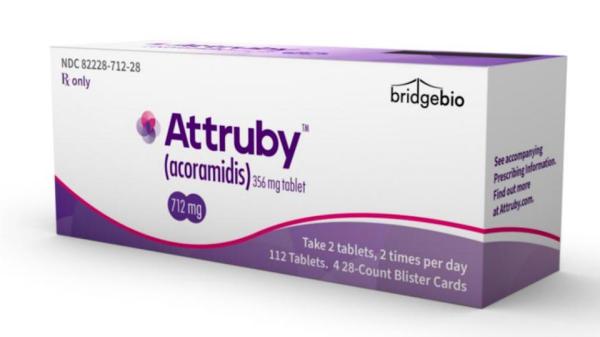Attruby
Pronunciation: ah-troo-be
Generic name: acoramidis
Dosage form: tablets (356mg)
Drug class: Transthyretin stabilizers
What is Attruby?
Attruby (acoramidis) is an oral prescription medicine used to treat heart problems due to cardiomyopathy of wild-type or hereditary transthyretin-mediated amyloidosis (ATTR-CM). Attruby works by stabilizing transthyretin (TTR) to help reduce death and cardiovascular-related hospitalization and improve quality of life. Attruby mechanism of action is by binding to TTR at thyroxine binding sites, which slows the formation of harmful amyloid protein deposits in the heart, slowing disease progression. Attruby (acoramidis) is a near-complete (≥90%) selective stabilizer of transthyretin (TTR),
Attruby FDA approval was granted on November 22, 2024, it is indicated for treating the cardiomyopathy of wild-type or variant transthyretin-mediated amyloidosis (ATTR-CM) in adults to reduce cardiovascular-related hospitalization and death. Attruby FDA approval was based on positive results from the ATTRibute-CM Phase 3 study, which showed a statistically significant treatment effect at 30 months on the Kansas City Cardiomyopathy Questionnaire and 6-minute walk test. Also, the patients on Attruby increase in protein NT-proBNP was about half of the placebo group; this indicates that the treated patients had less heart failure than untreated patients after 30 months.
What is ATTR-CM?
Transthyretin (trans-thy-re-tin) amyloid cardiomyopathy (ATTR-CM) is a very rare disease caused by a build-up of the amyloid protein called transthyretin in the heart. The heart muscle becomes stiff, enlarged, or thickened, which stops the heart from being able to pump effectively and eventually may lead to heart failure, and is potentially fatal.
Attruby side effects
Attruby side effects include diarrhea (11.6%) and upper abdominal pain (5.5%) in clinical trials. The number of people who discontinued treatment due to side effects was 9.3% in the Attruby-treated group and 8.5% in the placebo-treated group.
As with any medicine, hypersensitivity reactions are possible. Get emergency medical help if you have signs of an allergic reaction, such as hives, difficulty breathing, or swelling of your face, lips, tongue, or throat.
This may not be all of the possible Attruby side effects. Call your doctor for medical advice about side effects. You may report side effects to the FDA at 1-800-FDA-1088.
Related/similar drugs
Vyndamax
Vyndamax may be given to reduce death or hospitalization caused by heart problems in adults with ...
Amvuttra
Amvuttra is used to treat polyneuropathy associated with hereditary transthyretin-mediated ...
Ozempic
Learn about Ozempic (semaglutide) for type 2 diabetes treatment, weight management, cardiovascular ...
Vyndaqel
Vyndaqel (tafamidis meglumine) is a transthyretin stabilizer that may be given to reduce death or ...
Vutrisiran
Vutrisiran is used to treat adults with nerve damage (polyneuropathy) caused by hereditary ...
Warnings
There are no warnings, serious side effects, or contraindications for this medicine.
Before taking this medicine
Pregnancy
Tell your healthcare provider if you are pregnant, plan to become pregnant, or become pregnant during treatment, as it is not known if Atturby will harm your unborn baby. You may also report your pregnancy by calling the BridgeBio reporting line at 1-844-550-2246.
Breastfeeding
Tell your healthcare provider if you are breastfeeding or plan to breastfeed, as it is not known if Attruby passes into your breast milk. Talk to your healthcare provider about the best way to feed your baby while on this medicine.
Attruby Dosing Information
Take this medicine exactly as your healthcare provider tells you to take it.
Attruby tablets are taken orally twice daily (with or without food). Swallow tablets whole; do not cut, crush, or chew.
The usual Attruby dose is 712 mg (two 356 mg tablets) two times a day. Take this medicine exactly as your healthcare provider tells you to take it.
What other drugs will affect Attruby?
Tell your healthcare provider about all the medicines you take, including prescription and over-the-counter medicines, vitamins, and herbal supplements. Some medicines may affect how Attruby works, and Attruby may affect how some medicines work. Especially tell your healthcare provider if you take:
UDP-glucuronosyltransferases (UGT) Inducers and Strong CYP3A Inducers Attruby is metabolized by UGT enzyme-mediated glucuronidation. Concomitant use of UGT inducers can potentially decrease acoramidis exposure. While acoramidis is not metabolized by CYP3A, strong CYP3A inducers can also induce UGT enzymes. Avoid concomitant use of ATTRUBY with UGT inducers and strong CYP3A inducers.
Sensitive Cytochrome P450 2C9 (CYP2C9) substrates Attruby inhibits CYP2C9 and may result in an increase in CYP2C9 substrate concentrations when these drugs are both administered. Consider more frequent monitoring of patients for evidence of increased exposure (for example, signs of exposure-related toxicity) when Attruby is co-administered with sensitive CYP2C9 substrates.
Storage
- Store tablets at room temperature between 68°F to 77°F (20°C to 25°C).
- Store in original blister card until use to protect from moisture.
Ingredients
Active ingredient: acoramidis
Inactive ingredients: croscarmellose sodium, magnesium stearate, microcrystalline cellulose, and silicon dioxide. The film coating and printing ink contain black iron oxide, glyceryl monocaprylocaprate, hypromellose, polyvinyl alcohol, propylene glycol, talc, titanium dioxide, and vinyl alcohol graft copolymer.
Company
Attruby BridgeBio Pharma, Inc., Palo Alto, CA 94304.
References
More about Attruby (acoramidis)
- Check interactions
- Compare alternatives
- Pricing & coupons
- Drug images
- Side effects
- Dosage information
- During pregnancy
- FDA approval history
- Drug class: transthyretin stabilizers
- Breastfeeding
- En español
Professional resources
Related treatment guides
Further information
Always consult your healthcare provider to ensure the information displayed on this page applies to your personal circumstances.

